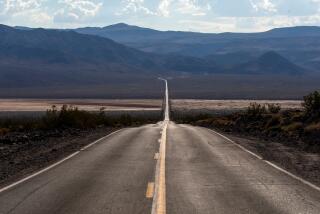Living on a Thumb and a Prayer
- Share via
The hitchhiker stood on the down-slope of the Santa Monica freeway onramp, looking like he needed a hot bath and a change of clothes. He held a crude, hastily drawn cardboard sign: “To I-5 or the 405.”
What kind of idiot hitchhikes nowadays? I thought.
What kind of idiot offers a lift?
And when did I become so judgmental?
It is not, after all, illegal to stick out your thumb to get from here to there. It’s not a crime to be too poor to buy bus fare.
So what is it about hitchhiking that makes me shudder?
The memories, of course. Mine and everyone else’s.
In my head, hitchhiking occupies a special place in the subsection of recall reserved for breathtakingly bad decisions that might have killed me but didn’t: bad boys. Bad drugs. Bad boys on bad drugs. And so on.
Other people, we have recently been reminded, were not so lucky. When the state exacted the ultimate price of William Bonin the week before last, it snuffed the life of a man who could probably take responsibility for ending hitchhiking as we knew it in California, once upon a more innocent time.
*
It was Easter vacation, 1967. Beach camping at Leo Carillo with my best friend. We were in the sixth grade, too cool, and we just had to get away from her drippy family. So we stood on Pacific Coast Highway, thumbs out and cadged a ride north to County Line. We were looking for romance and adventure. We were looking for surfers. The ride was short, uneventful and, ultimately, emboldening. (The surfers, it turned out, were also too cool--for us.)
For years after that until we hit the age of liberation--16--hitchhiking was about getting from the Valley to the beach and back. It was an adventure, it was thrilling, and, naturally, we were invulnerable because we weren’t stupid enough to do it alone. (Ah, youth.)
There was a cramped ride through Malibu Canyon in an Austin Mini with two stoners who suddenly pulled off the road, grabbed a paper bag from under a seat and announced that they had to stash a kilo and would be right back. We looked at each other wide-eyed: Cool!
There was a hung-over Marine, just back from the war, whose driving was so erratic, and whose eyes were so hollow, that we asked him to drop us off at the top of Topanga Canyon, miles and miles from home.
And then, one day, there was my 15-year-old sister, who arrived home breathless. She’d been sitting at a bus stop, on her way to see her boyfriend. A man stopped for directions, then asked if she could use a lift. In his car, she pressed her schoolbooks to her chest. Tell me about your classes, he said, pushing her books onto her lap. At a light, he reached over and grabbed her breast.
“How could you do that to me?” she cried, as she leaped out of the car. “I trusted you!”
A real jerk, we pronounced, and continued to thumb our way to the seashore and back.
*
After 10th grade, there were always cars, except for one year--1976--when I studied in France. No one had wheels and we still did not have the sense to be afraid of strangers. We reverted to our old habits.
One weekend, my roommate and I were picked up by two men in a windowless van. As the driver hit the road, his companion picked up a metal rod and barred the door, medieval style.
“Ever had anything bad happen to you on the road?” he said with a mean French smile, as our mouths went dry. He and the driver laughed. A joke on the silly American girls.
At the end of that year, for reasons that remain mysterious, my roommate, a male friend and I took a notion to hitchhike around the Mediterranean. We would make a magic loop down the east coast of Spain; across the tops of Morocco, Algeria, Tunisia, Libya and Egypt; up to Greece; and back to Paris.
As Americans, we were objects of extraordinary curiosity and hospitality. Were we both wives of our male companion? Did we know Stevie Wonder? What did we think of the Arab people?
In Libya, we discovered an upside to tourism in a military dictatorship: Soldiers at checkpoints along the coastal highway insisted on flagging down cars for us; we were not permitted to lift a thumb.
Which is how we ended up with Francesco, the Italian employee of a Libyan shipping magnate named Mr. Zatout. It wasn’t every day that three American college students wandered into Benghazi; Francesco delivered us like bounty to his boss, who plied us with Dunhill cigarettes, lectured us about the beneficence of Moammar Kadafi, the evils of Israel (the 51st American state, he called it), the world’s maligning of the great Mussolini.
He put us up in a hotel, bid us to stay as long as we wished, then left. We stayed two days and never saw him again.
And we never hitchhiked after that year, either.
These days, when we reminisce, we can’t believe our dumb luck, our blind faith, our poor judgment. And we all agree: If we ever catch our kids doing what we did, we’ll ground ‘em till they turn 30.
* Robin Abcarian’s column appears Wednesdays and Sundays. Readers may write to her at the Los Angeles Times, Life & Style, Times Mirror Square, Los Angeles, CA 90053.
More to Read
Sign up for The Wild
We’ll help you find the best places to hike, bike and run, as well as the perfect silent spots for meditation and yoga.
You may occasionally receive promotional content from the Los Angeles Times.







